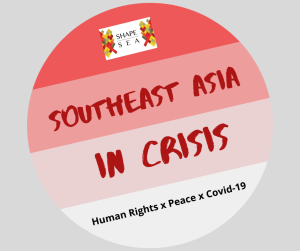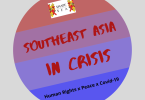Reni JuwitasariResearch Associate, Asian Research Center for International Development (ARCID)School of Social Innovation, Mae Fah Luang Universityreni.juw@mfu.ac.th
 Let me first tell you about my family living in a small city in West Java. My family is like any other family in Indonesian society traditionally religious, closely knit, and lower middle class. Moreover, just like any other family, we have parents, siblings and neighbors who smoke. We are also surrounded by “kepo†(those who mind others’ business) neighbors who always have something to gossip about. These seemingly rather trivial realities place these kinds of social units at high risk of Covid-19 infection. Such social structure are deemed to be most affected by the pandemic and current government policies related to health, safety and economy.When the Covid-19 outbreak was officially announced in Indonesia, my family and neighbors did not take it seriously. “God can solve the problem,†is their usual response to a catastrophe of such scale. What would be the worst thing happen to our small-rural living community? But later when it was hitting home, I realized that impacts are real and that mere divine intervention cannot solve it. In a heartbeat, this pandemic has forced us to leave behind a normal life.As the largest Muslim population in the world, Indonesians have been trying to adapt to new ways of faithful practice during this health crisis. Muslim could not pray together at the mosque, especially during Friday prayers. This issue becomes a dilemma of belief and practice especially among male Muslims. Aggressive action was forcefully expressed in order to enter the mosque. Some groups even protested mentioning “the government does not support, and forbids them to do prayerâ€. Following this, Majelis Ulama Indonesia (MUI) or the Indonesian Council of Religious Scholars declared a Fatwa or Religious Instruction Number 14-2020 related to restricted worship amid covid-19, which calls for people to pray at home (BBC, 2020). More Ustadz or religious leaders followed suit. They explained that such practice still allows Muslims to accomplish five prayers a day. (Tirto, 2020).In just a few days, Ramadhan, a month-long fasting occasion for Muslims, will dawn upon us. For Muslims in Indonesia, it is a chance to be with family, to pray together with others at the mosque and, of course, to gain more income, especially for people who heavily rely on informal business. The seasonal income is an opportunity to pay off debts or even to save for children’s educational future. Young working people have been looking forward to head back to their hometowns, and observe the month with their families. Ramadhan month also provides kids to enjoy and receive gifts from their relatives. Ramadhan is also a chance for duafa or people living under poverty to benefit from zakat or alms, which is given on the day of Id Fitri. In short, Ramadhan is not only a month of praying but also a month of celebration.However, with COVID-19 in our midst, the way people view and practice Ramadhan will not be the same any longer. For the lower middle class, the pandemic has paralyzed any prospects of getting socially and economically ahead. Furthermore, it has disrupted ways of how families earn and fend for their needs. The breadwinner, which is usually the father, have to scramble to earn money in light of unemployment or closure of business. Furthermore, those living in bigger cities are forced to return home in order to avoid any additional expenses and burdens.This Covid-19-induced diaspora has catalyzed a wave of infections in rural areas throughout the country. In fact, on 26 March 2020, it has been reported that some of those who returned to my city were detected to have the virus. Some had already died. Such economic insecurity had led to a much bigger health threat to local communities. Covid-19 has, indeed, changed the ways rural and traditional families and communities operate. Before people look forward to the return of family members. Now it has become the opposite.The “new normal†brought about fear, and had taken away key aspects of our humanity. This stems from the increased insecurities of many who, for the longest time, have been living and earning for survival. One thing is for sure, we must be ready to sacrifice our old traditions for the sake of beating COVID-19.References:BBC. (2020). Coronavirus: MUI inaugurated Fatwa on holding of worship amid Covid-19. Retrieved from: https://www.bbc.com/indonesia/indonesia-51867023.Tirto. (2020). A Law of Not Doing Friday Prayer Three Times in Raw amid Novel Coronavirus. Retrieved from: https://tirto.id/hukum-tidak-shalat-jumat-3-kali-beruntun-dalam-pandemi-corona-eLSi.
Let me first tell you about my family living in a small city in West Java. My family is like any other family in Indonesian society traditionally religious, closely knit, and lower middle class. Moreover, just like any other family, we have parents, siblings and neighbors who smoke. We are also surrounded by “kepo†(those who mind others’ business) neighbors who always have something to gossip about. These seemingly rather trivial realities place these kinds of social units at high risk of Covid-19 infection. Such social structure are deemed to be most affected by the pandemic and current government policies related to health, safety and economy.When the Covid-19 outbreak was officially announced in Indonesia, my family and neighbors did not take it seriously. “God can solve the problem,†is their usual response to a catastrophe of such scale. What would be the worst thing happen to our small-rural living community? But later when it was hitting home, I realized that impacts are real and that mere divine intervention cannot solve it. In a heartbeat, this pandemic has forced us to leave behind a normal life.As the largest Muslim population in the world, Indonesians have been trying to adapt to new ways of faithful practice during this health crisis. Muslim could not pray together at the mosque, especially during Friday prayers. This issue becomes a dilemma of belief and practice especially among male Muslims. Aggressive action was forcefully expressed in order to enter the mosque. Some groups even protested mentioning “the government does not support, and forbids them to do prayerâ€. Following this, Majelis Ulama Indonesia (MUI) or the Indonesian Council of Religious Scholars declared a Fatwa or Religious Instruction Number 14-2020 related to restricted worship amid covid-19, which calls for people to pray at home (BBC, 2020). More Ustadz or religious leaders followed suit. They explained that such practice still allows Muslims to accomplish five prayers a day. (Tirto, 2020).In just a few days, Ramadhan, a month-long fasting occasion for Muslims, will dawn upon us. For Muslims in Indonesia, it is a chance to be with family, to pray together with others at the mosque and, of course, to gain more income, especially for people who heavily rely on informal business. The seasonal income is an opportunity to pay off debts or even to save for children’s educational future. Young working people have been looking forward to head back to their hometowns, and observe the month with their families. Ramadhan month also provides kids to enjoy and receive gifts from their relatives. Ramadhan is also a chance for duafa or people living under poverty to benefit from zakat or alms, which is given on the day of Id Fitri. In short, Ramadhan is not only a month of praying but also a month of celebration.However, with COVID-19 in our midst, the way people view and practice Ramadhan will not be the same any longer. For the lower middle class, the pandemic has paralyzed any prospects of getting socially and economically ahead. Furthermore, it has disrupted ways of how families earn and fend for their needs. The breadwinner, which is usually the father, have to scramble to earn money in light of unemployment or closure of business. Furthermore, those living in bigger cities are forced to return home in order to avoid any additional expenses and burdens.This Covid-19-induced diaspora has catalyzed a wave of infections in rural areas throughout the country. In fact, on 26 March 2020, it has been reported that some of those who returned to my city were detected to have the virus. Some had already died. Such economic insecurity had led to a much bigger health threat to local communities. Covid-19 has, indeed, changed the ways rural and traditional families and communities operate. Before people look forward to the return of family members. Now it has become the opposite.The “new normal†brought about fear, and had taken away key aspects of our humanity. This stems from the increased insecurities of many who, for the longest time, have been living and earning for survival. One thing is for sure, we must be ready to sacrifice our old traditions for the sake of beating COVID-19.References:BBC. (2020). Coronavirus: MUI inaugurated Fatwa on holding of worship amid Covid-19. Retrieved from: https://www.bbc.com/indonesia/indonesia-51867023.Tirto. (2020). A Law of Not Doing Friday Prayer Three Times in Raw amid Novel Coronavirus. Retrieved from: https://tirto.id/hukum-tidak-shalat-jumat-3-kali-beruntun-dalam-pandemi-corona-eLSi.





